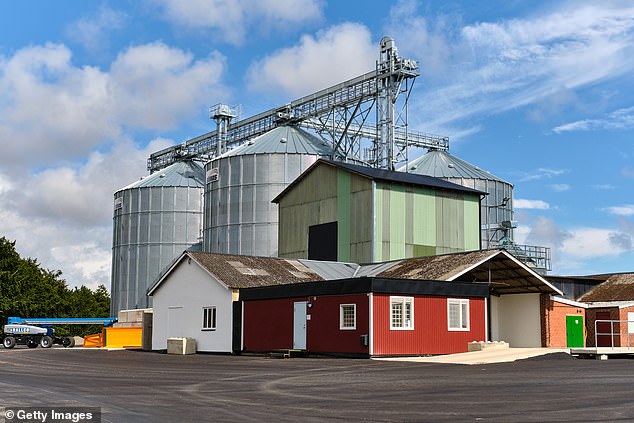Sweden is set to begin stockpiling food as it prepares for war, with top ministers admitting there is a risk that the nation may be ‘completely cut off’ by Vladimir Putin.
The NATO member is set to invest 575 million krona (£45millon) in grain reserves, as part of the country’s next budget.
Civil Defence Minister Carl-Oskar Bohlin admitted: ‘We are well aware that the risk of Sweden becoming completely cut off is very low, but the risk of complex supply chains being disrupted with major and unpredictable consequences in the event of war and conflict is unfortunately more likely’.
He said the first stockpiles will be established in northern Sweden in the counties of Norrbotten, Vasterbotten, Vasternorrland and Jamtland.
These counties are currently entirely dependent on grain transported from southern Sweden – the oblong country is roughly 1,000 miles from north to south – which could be problematic in the event of a crisis or war.
Bohlin said: ‘Northern Sweden is strategically important for the military and is a particular priority for (the country’s) total defence.
‘It is no coincidence that it is here the first steps are being taken towards establishing emergency grain stocks, which essentially is about ensuring that the population can put food on the table even in times of crisis.’
Sweden revived its ‘total defence’ strategy in 2015 following Russia’s annexation of Crimea, and more measures were introduced after Moscow’s full-scale invasion of Ukraine in 2022.

The NATO member is set to invest 575 million krona (£45millon) in grain reserves, as part of the country’s next budget (File image of a grain silo in Sweden)
The idea is to mobilise all of society, from authorities to citizens and businesses, to collectively resist armed aggression while maintaining essential functions.
The Board of Agriculture said that 90 to 95 percent of the population could survive on grains for three months without suffering any nutrient deficiencies.
Dietary needs change in times of war, it noted, saying that the average number of calories required per person rises to 3,000 a day.
Earlier this year, Sweden announced it was spending 100million krona (£7.86million) on checking and renovating its civil defence bunkers, amid rising fears of a war with Russia.
With 64,000 sites spread across the country, Sweden already has more shelters than almost every other nation with space for around seven million people – more than two-thirds of its population.
But since Sweden joined NATO in March 2024, its Civil Contingencies Agency (MSB) has stepped up inspections of the shelters, some of which are large enough to accommodate thousands of people at a time.
The bunkers are designed to provide protection against shockwaves and bomb fragments, the blast and heatwaves from a nuclear weapon, radioactive fallout, gas from chemical weapon and biological weapons.
MSB said it had begun a huge project to modernise the nuclear shelters – a task it expected to take ‘two to three years’ – which includes efforts to upgrade filters which help protect occupants from chemical and radiological weapons.

With 64,000 sites spread across the country, Sweden already has more shelters than almost every other nation with space for around seven million people – more than two-thirds of its population
Prime Minister Ulf Kristersson said in January that Sweden was ‘not at war… but there is not peace either’, citing hybrid attacks and suspected sabotage across the region.
Last year, Sweden sent out five million pamphlets to residents urging them to prepare for the possibility of war, with instructions on how to stockpile food and even seek shelter during a nuclear attack.
Since the the start of the war in Ukraine, Stockholm has repeatedly urged Swedes to prepare both mentally and logistically for a possible conflict, citing the worsening security situation in its vicinity.
The booklet ‘If Crisis or War Comes’, sent out by the Swedish Civil Contingencies Agency (MSB), contains information about how to prepare for emergencies such as war, natural disasters, cyber attacks and terrorism.
‘An insecure world requires preparedness. The military threat to Sweden has increased and we must prepare for the worst – an armed attack,’ its new introduction states.
In one of the more worrying excerpts, which harks back to advice given by governments during the darkest days of the Cold War, it informs people of the risk of nuclear weapons.

Civil Defence Minister Carl-Oskar Bohlin said that as the global context had changed, advice to Swedish households had to be reviewed to reflect the reality of the situation
‘The global security situation increases the risks that nuclear weapons could be used. In the event of an attack with nuclear, biological or chemical weapons, take cover in the same way as in an air attack,’ the pamphlet instructs readers.
‘Shelter provides the best protection. After a couple of days, the radiation has decreased significantly,’ it advises, adding that people will be warned of attacks over the radio and should go to basements or subways if there is no better option.
Another message, which has been brought forward from the middle of the booklet in the updated version, reads: ‘If Sweden is attacked by another country, we will never give up. All information to the effect that resistance is to cease is false.’
This article was originally published by a www.dailymail.co.uk . Read the Original article here. .

